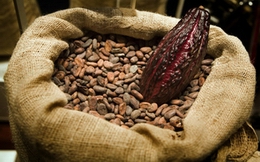 Cocoa imports by Indonesia may more than double next year, transforming the third-largest grower into a net buyer, as companies process more beans for chocolate, said the Indonesian Cocoa Association. Futures climbed for the first time in five days.
Cocoa imports by Indonesia may more than double next year, transforming the third-largest grower into a net buyer, as companies process more beans for chocolate, said the Indonesian Cocoa Association. Futures climbed for the first time in five days.Purchases will probably rise to 100,000 metric tons from 40,000 tons this year, said Chairman Zulhefi Sikumbang. Grinding capacity will gain to 550,000 tons in 2014 from below 500,000 tons now as the harvest stays at 450,000 tons, he said in an interview. Exports will drop 26 percent this year to 100,000 tons, the lowest in more than a decade, the group said Jan. 23.
Declining supplies from Indonesia may curb the 6.6 percent drop in bean prices in New York this year. Global demand is set to outstrip supply through 2014-2015 as pests, disease and aging plantations curb production, says the International Cocoa Organization. The market may have a shortage of 58,000 tons this season through September, says Rabobank International.
“This development will be price supportive in so far as it leads to a global shortage of beans to traditional importers in Europe and North America; but also as emerging demand from Southeast Asia grows,” said Abah Ofon, a Singapore-based analyst at Standard Chartered Plc. “I think it will fundamentally change the shape of the industry.”
Cocoa for May delivery climbed as much as 1.5 percent to $2,119 a ton on ICE Futures U.S., the biggest intraday jump in a week, before trading at $2,096 at 9:41 a.m. in London.
AFRICAN BEANS
Investors are building new plants and improving facilities, Sikumbang said at an ICCO meeting in Bali, Indonesia yesterday. Capacity expanded after the government taxed bean exports in 2010. Rates range from zero if the average price in New York is below $2,000 a ton to 15 percent if it’s above $3,500. The duty is 5 percent this month.
Producing nations from Ivory Coast to Indonesia will process about 50 percent of all beans within three years as they seek to extract more value, the ICCO estimated last year. Grinders in Indonesia imported about 30,000 tons of beans from West Africa last year, and purchases are expected from Papua New Guinea this year and next, Sikumbang said.
Exports from Indonesia have fallen. They dropped to 136,000 tons in 2012 from 439,305 tons three years earlier, association data show. The harvest starting April will probably be little changed at 475,000 tons, according to the median of five industry estimates compiled by Bloomberg. Production may not increase because trees are aging, said Sikumbang.
RUBBER, PALM
“Half of them are more than 20 years old and farmers are shifting to more profitable crops such as oil palm and rubber,”he said. Indonesia has about 1.5 million hectares (3.7 million acres) of plantations, the association says.
The government is trying to boost output by grafting, dispensing new seeds and helping farmers care for their trees.
“Everybody has already sort of positioned themselves to realize that Indonesia isn’t going to be a major supplier of beans on the market anymore,” said Keith Flury, a commodity analyst at Rabobank in London. “Western African bean exports are even more important globally because now much of the bean availability is concentrated there.”
Ivory Coast is the world’s biggest producer, followed by Ghana and Indonesia.





